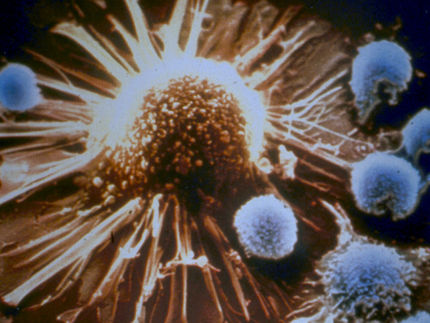First dual-targeting nanoparticles lower cancer's defenses and attack tumors
cancer immunotherapy has emerged as one of the most exciting directions in cancer treatment. But the approach only works in a fraction of patients and can cause nasty side effects. Now scientists report the development of the first dual-cell targeting immunotherapy nanoparticle that slows tumor growth in mice with different cancers. In their study, up to half the mice in one cancer group went into full remission after the treatment.
Immunotherapy works by giving the body's own immune system a boost in its fight against disease. In cancer patients, there are two main lines of immunotherapy: One disables cancer cells' ability to hide from the immune system, and the other recruits the body's T cells to destroy tumors. Jonathan P. Schneck and colleagues wanted to see if they could combine these two tactics with one nanoparticle-based platform.
To incorporate these two functions into one system, the researchers developed "immunoswitch" nanoparticles. They're designed to simultaneously turn off a pathway on tumor cells that would otherwise be used to become invisible to the immune system, and turn on a specific T cell process that launches them into action against cancer cells. Testing on mouse models of melanoma and colon cancer showed that animals injected with the nanoparticles lived longer than those that did not receive the nanoparticles, and their tumor growth was delayed or even reversed in some cases. That the nanoparticles were effective against two different cancers suggests that they could help treat a variety of tumor types. Further analysis found that the platform created a synergistic effect, which researchers say allowed them to use low treatment concentrations to potentially reduce the severe side effects that dual immunotherapy is known for.
Original publication
Original publication
Alyssa K. Kosmides, John-William Sidhom, Andrew Fraser, Catherine A. Bessell, and Jonathan P. Schneck; "Dual Targeting Nanoparticle Stimulates the Immune System To Inhibit Tumor Growth"; ACS Nano; 2017
Topics
Organizations
Other news from the department science
These products might interest you

Eclipse by Wyatt Technology
FFF-MALS system for separation and characterization of macromolecules and nanoparticles
The latest and most innovative FFF system designed for highest usability, robustness and data quality

DynaPro Plate Reader III by Wyatt Technology
Screening of biopharmaceuticals and proteins with high-throughput dynamic light scattering (DLS)
Efficiently characterize your sample quality and stability from lead discovery to quality control

Get the life science industry in your inbox
By submitting this form you agree that LUMITOS AG will send you the newsletter(s) selected above by email. Your data will not be passed on to third parties. Your data will be stored and processed in accordance with our data protection regulations. LUMITOS may contact you by email for the purpose of advertising or market and opinion surveys. You can revoke your consent at any time without giving reasons to LUMITOS AG, Ernst-Augustin-Str. 2, 12489 Berlin, Germany or by e-mail at revoke@lumitos.com with effect for the future. In addition, each email contains a link to unsubscribe from the corresponding newsletter.


















































